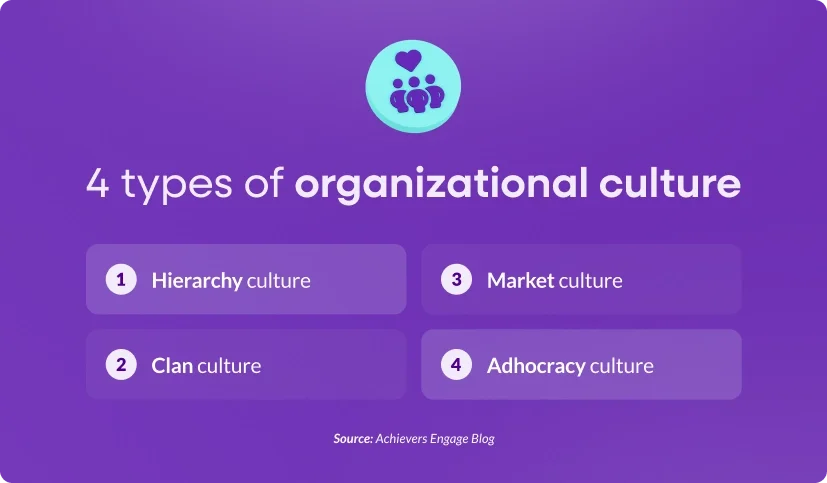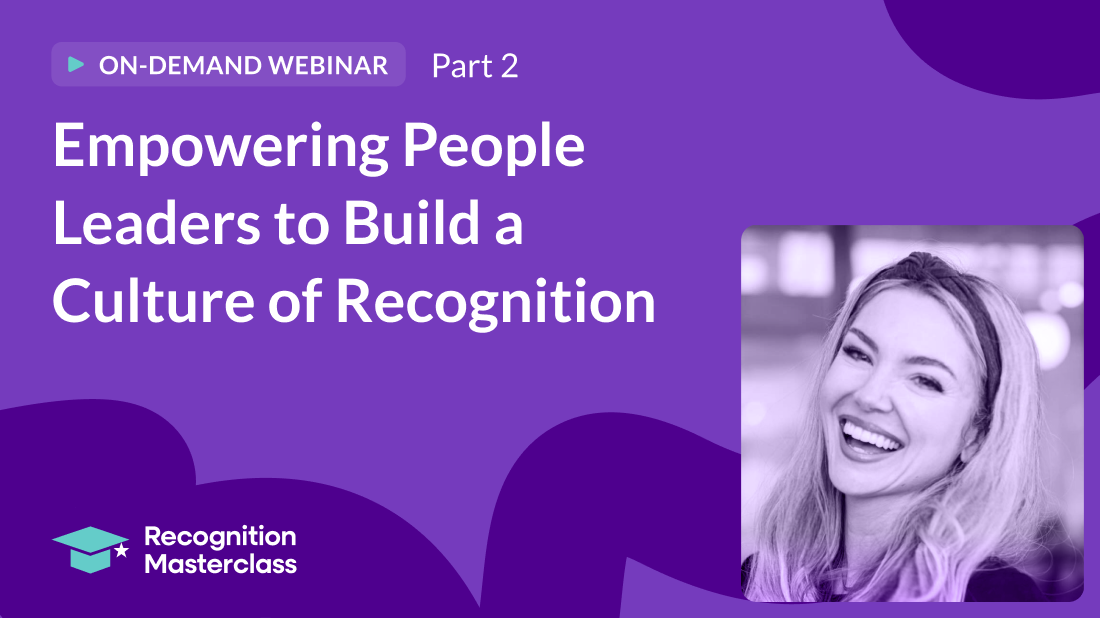Table of contents
The best corporate culture examples inspire businesses to think critically and thoughtfully about the way they value their employees. The ones that get it right are rewarded with top talent and retention — because when employees feel connected to a company’s mission, values, and culture, they’re less likely to look for opportunities elsewhere.
But a strong corporate culture does more than retain employees — it drives productivity, encourages innovation, and reinforces the behaviors that contribute to organizational success. In fact, Gallup researchers found that a strong organizational culture helped their clients achieve an 85% net profit increase over five years.
By creating cultures that prioritize employee well-being, organizations not only enhance engagement but also lay the groundwork for sustainable growth and resilience.
Getting workplace culture right is a must for every organization, but it’s hard to know where to start. These corporate culture examples highlight how organizations can build professional environments that attract and retain top talent, increase engagement, and drive success — with actionable steps you can start implementing today.
What is the best organizational culture?
The best organizational culture is built from the ground up. It’s core values, leadership attitudes, employee behavior, and business processes all rolled into one. These elements come together to create the foundation for an incredible culture. They include:
- Strong leadership: Leadership that can offer clarity into their vision and strategy while communicating effectively is essential to building great culture.
- Employee engagement: If employees are satisfied with their roles and display high levels of commitment to the company, they’ll be more productive.
- Open communication: Encourage open, honest conversations across the organization to build transparency, strengthen teamwork, and boost collaboration.
- Diversity and inclusion: Prioritize diversity, inclusion, and promote equity, because the best organizational cultures create a sense of belonging for all employees.
- Employee well-being: A great company culture cares about employee well-being, which includes support for mental health, work-life balance, and overall wellness.
- Recognition and rewards: Culture with rewards and recognition will boost employee retention, morale, and help workers feel valued and acknowledged.
- Career development: Opportunities for professional development whether it’s through mentorship, learning new skills, and a culture of promoting from within, are indicators of a strong company culture.
15 best corporate culture examples of 2025
Today’s top corporate cultures are examples of what it means to prioritize employees and encourage the behaviors that help drive organizational success. These companies are living their values and creating environments where employees are given the tools and support they need to do their best work.
Let’s explore the 13 best corporate culture examples of 2025:
1. Achievers
Achievers believes in changing the way the world works, starting with building better workplace cultures. As a leading recognition and rewards provider, Achievers understands first-hand what it means to invest in people. Through their company-wide values, they’ve created an environment where employees feel connected, empowered, and appreciated.
Achievers’ values:
- It’s the people: Value inclusivity and celebrate the unique contributions each individual brings to the company’s culture.
- Be bold: Inspire creativity, deliver continuous innovation, and find opportunity in failure.
- Own the outcome: Act with a sense of urgency. Think big, prioritize, take action, and be accountable for the outcome.
- One team: Leverage shared genius and promote teamwork by embracing authentic, timely communication.
- Win with customers: When their customers are successful, Achievers is successful.
Their recognition platform, Achievers Recognize, is rooted in frequent, meaningful recognition. It’s a space to celebrate employee wins, big and small, and gives team members a space to recognize their peers and leaders. Their AI inclusion tool enables users to promote inclusive and unbiased recognition, ensuring every employee feels respected.
By making recognition part of the daily routine, Achievers helps organizations build stronger connections and feel valued for the work they do. On top of that, Achievers Listen gives employees a real voice, creating an open space for honest feedback and helping leaders take meaningful steps to improve workplace culture.
Achievers isn’t just about technology — it’s about creating a culture where people thrive. They give companies the tools to make sure every team member feels seen, heard, and aligned with the bigger mission. It’s this focus on people and innovation that makes Achievers a standout when it comes to building amazing corporate cultures.
2. Patagonia
Patagonia’s values include: “build the best product,” “cause no unnecessary harm,” and “use business to protect nature.” These values attract dedicated candidates who align well with the organization’s culture. Patagonia’s perks include two-month paid volunteer trips with an environmental organization as a first-anniversary gift and onsite childcare centers.
3. The Body Shop
There are a number of aspects that make The Body Shop’s culture special, including their commitment to ethical sourcing. They’re in support of fair trade and community trade practices that help local communities, and source natural ingredients thoughtfully and responsibly. Plus, they take a cruelty-free approach to their product development, campaigning against animal testing as well as backing human rights causes.
4. Pixar
An important aspect of Pixar’s culture is promoting collaboration and teamwork. Catmull recommends knocking down department silos as red tape stifles creativity and limits communication, putting a damper on quality. Instead, they ran daily meetings called “dailies” that provided channels for regular feedback and established “brain trusts” of directors and other leaders who pushed movie teams towards excellence.
5. Google
Google’s mission is to “organize the world’s information and make it universally accessible and useful.” Besides the fact that Googlers have the company’s vision memorized, this lofty goal resonates with employees and drives them forward. Google also sets itself apart in its now classic “ten things we know to be true” core values, which reinforce the concepts of doing good, working fast, and delivering excellent service.
6. Zappos
Zappos’ values aren’t your typical company values. Instead, they consist of statements like “Create Fun and A Little Weirdness,” “Deliver WOW Through Service,” and “Be Adventurous, Creative, and Open-Minded.” Zappos believes in its way of doing business so much that it’s created Zappos Insights, a group that evangelizes Zappos’ culture worldwide.
7. Sky
Sky, a British broadcaster and telecommunications company, places a strong emphasis on respect and integrity — fostering a work environment that adheres to high ethical standards. Sky’s core values highlight its commitment to creativity, customer focus, inclusivity, collaboration, fairness, and forward-thinking.
8. Spotify
Spotify has learned to embrace the uncertainty of the ever-evolving music industry while unlocking innovation in its employees, and this stems from its core values: innovative, sincere, passionate, collaborative, and playful. Besides organizing their core values in the form of a “Band Manifesto“, their careers webpage also refers to managers as those who lead the band.
9. Netflix
Netflix has created what they call an “amazing and unusual” culture to keep their stream of popular content going. Some hallmarks of Netflix’s culture are its high expectations, candidness, and accountability. As Patty McCord, former Chief Talent Officer, puts it, Netflix has “a built-in expectation of high performance, radical honesty, and the motto ‘we’re not family.’”
10. Telstra
Telstra’s purpose is built on a connected future, one where everyone can succeed. The Australian telecommunications company offers a variety of employee benefits, such as competitive salaries that are higher than the national average, on-the-job career mentorship, wellness programs, and initiatives in support of mental health.
11. Atlassian
Atlassian’s culture is led by openness, passion, teamwork, a commitment to change, and putting the customer first. These thoughtfully defined values were designed to attract the right employees to the Australian software company while repelling the wrong ones.
12. Workday
Workday is rooted in the well-being of its employees, tending to a cohesive community, and having a collective growth mindset. With values centered around customer satisfaction, integrity, and fun, Workday aims to create a work environment where employees feel valued and voice their opinions regularly by providing feedback through weekly surveys, integrated with Achievers.
13. HubSpot
Tenets of HubSpot’s culture code include favoring accountability and autonomy, being as transparent as possible, and taking long-term impact into account. Some of their benefits include encouraging their employees to pursue personal and professional growth through continuous learning and placing work-life balance at the forefront.
14. Salesforce
Salesforce’s Ohana Culture fosters inclusivity, trust, and innovation while prioritizing employee well-being. Benefits include mental health resources, parental leave, and flexible work. Its 1-1-1 model supports philanthropy, and engagement thrives through resource groups, feedback, and transparency, making it a top choice for purpose-driven professionals.
15. Costco
Costco’s employee-first culture prioritizes fair wages, career growth, and work-life balance. With low turnover and high loyalty, it offers above-average pay, healthcare for part-timers, and retirement benefits. Ethical leadership, internal promotions, and transparency make Costco one of retail’s top employers.

What are the 4 main types of organizational culture?
While there are many types of organizational cultures, most can be grouped into four main categories. Researchers Kim Cameron and Robert Quinn from the University of Michigan studied what makes organizations successful and found these four key types of cultures:
- Hierarchy culture: Focuses on efficient processes, clear communication, and stability with defined lines of authority and accountability.
- Clan culture: Emphasizes a people-first approach with horizontal structures, prioritizing morale, employee experience, and strong relationships.
- Market culture: Results-driven and competitive, with measurable targets, financial success, and market leadership as key goals.
- Adhocracy culture: Encourages risk-taking, bold ideas, and innovation, with success measured by new products, services, and trendsetting.
Let 2025’s corporate culture examples inspire your organization
Today’s top corporate cultures are an example of the value employee recognition and engagement can have on your organization. Building a better corporate culture starts with recognizing employees for their hard work and dedication. When employees feel seen by their peers and managers, they’re more engaged, productive, and less likely to look outside the organization for opportunities.
That’s where Achievers comes in. Achievers is a science-backed employee experience platform that allows teams to give both social and monetary recognition anytime, anywhere. With premium software integration and employee voice solutions, you can collect real-time anonymous feedback. It’s an easy way to understand how they truly feel about their work, helping you create a culture of trust and transparency that drives success.


Corporate culture examples FAQ
Key insights
- Employees are more likely to stay when they feel aligned with a company's purpose and values.
- Great workplace culture thrives on diversity, open communication, and consistent recognition.
- Tailored cultures that match organizational goals and employee values drive success.
